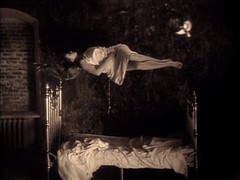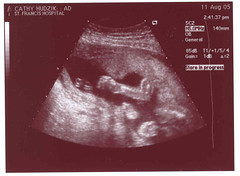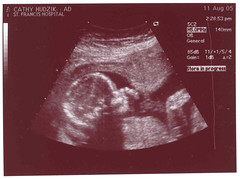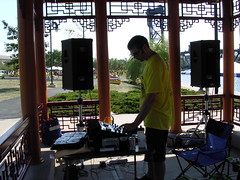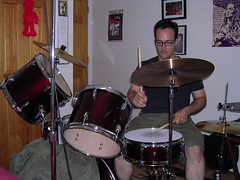In the dream I had last night I was driving in a Minivan with my immediate family. At least I’m pretty sure it was my immediate family, dream logic being so screwy and all. A mournful song was playing on the radio and somebody asked if I knew who the artist was. Speaking authoritatively, I said it was a Philip Glass piece from the early 80’s. I was interrupted, however, by a rumpled Philip Glass himself, who was lying in the far back of the car’s interior, the space usually reserved for luggage, groceries and the occasional minimalist composer. “Actually, “ he refuted, much to my embarrassment, “it’s an 18th century composition, one that has had quite an impact on my own work.” He rummaged about the space and held up a CD. “I think the folks at Telarc have the finest version of this piece available.” Calling me on my mistake, one of my older brothers laughingly pointed to Philip Glass and said, “From no less an authority then the man himself.”
I also recently had a dream about our baby talking at 2 weeks.
"My deepest impulses are optimistic, an attitude that seems to me as spiritually necessary and proper as it is intellectually suspect."
-Ellen Willis
Who Am I? Chris Breitenbach
Contact Me: chrisbreitenbach@hotmail.com
Saturday, August 27, 2005
Tuesday, August 23, 2005
Poor Richard's Armonica and Septuagenarian Desires
I had no idea that, among his numerous other inventions (the lightning rod and bifocals being among the most well known) Benjamin Franklin also invented a popular, at least in its day, musical instrument called the Armonica. Here’s an excerpt from H.W. Brands alternatingly grueling and fascinating biography of Franklin, The First Amarican:
Franklin did not exaggerate when he described the armonica’s tones as “incomparably sweet.” They had a haunting, ethereal quality, much like that which would characterize “New Age” music more than two hundred years later. Franklin quickly became adept at playing, and took to entertaining guests on the instrument. Others followed his lead. Marianne Davies, a singer who played flute and harpsichord- and who was another young woman charmed by Franklin- became proficient enough to offer public performances. For a time the armonica achieved a genuine vogue. Royal wedding vows were exchanged in Vienna to armonica accompaniment; some of the greatest composers of the eighteenth and early nineteenth centuries, including Mozart and Beethoven, wrote for Franklin’s instruments.
You can play an approximation of the Armonica here.
Of those core (and near mythological) founding fathers, Franklin is the one I’d most like to share a beer with. Washington was too regal, Adams too puritanical, Hamilton too overwhelmingly scintillating and Jefferson and Madison too connivingly political. Franklin, however, seems the most human, a Renaissance man securely tethered to the joys of the quotidian, a polymath able to hold his own with experts in the fields (to name just a handful) of geology, linguistics or electricity and yet never flaunting his intellectual prowess to such an extent or degree as to miss the opportunity to gain the affection of the common man. He, of all the founding fathers had the best sense of humor, the most flirtatious sense of fun and the most unwavering and appealing temperament. Of all the founding fathers, Franklin is the only one I can imagine barreling down a water slide, spilling out into the waiting pool and emerging with an amused smile and sparkle in the eye ready for another go.
He was also a notorious, highly accomplished flirt. One of the ways history has distilled Franklin’s character, or that of any of the founding fathers, is to trim away anything but the mythos-Washington chopping down the cherry-tree, for example, or Franklin and his electric kite. To become an icon is to lose nuance, shades and degrees of an otherwise complex life lost to the majority in favor of readily digestible fable. So, in addition to his juiced up kite, most folks, I’m assuming, know something (maybe just a hint) of Franklin’s reputation as a lover. Brand thankfully helps to shed more light on Franklin’s amorous charms, focusing most intensely on his time in Paris when Congress had appointed Franklin to a Committee of Secret Correspondence in hopes of gaining foreign support, namely that of France, for the war back home.
Then in his 70’s, Franklin was well known and adored by the French, who considered him one of their own. In between his talks with Comte de Bergennes, King Louis’s foreign minister, Franklin stayed in the rustic village of Passy, just outside Paris where he summoned his many septuagenarian charms in service of wooing numerous objects of affection.
Madame Foucalt, sister of Madame Chaumot who in turn was the wife of Franklin’s landlord, Jacques Donatien Leray of Nantes, was one such pursued interest. Brand quotes liberally from their letters, the sparring contents of which are a blast to read, with Franklin administering a variety of deliciously naughty reasons why she should sleep with him while she nimbly curtsies and denies him. Franklin tries again:
Adopting yet another analogy, he likened their sparring to war, and proposed a preliminary peace treaty.
Art. 1. There shall be eternal peace, friendship and love between Madame B. and Mr. F.
Art. 2. In order to maintain the same inviolably, Made. B. on her part stipulates and agrees that Mr. F. shall come to her
whenever she sends him.
Art. 3. That he shall stay with her as long as he pleases.
A few more concessions on his part, then:
Art. 8. That when he is with her he will do what he pleases.
Art. 9. And that he will love any other woman as far as he finds her amiable.
Let me know what you think of these preliminaries. To me they seem to express the true meaning and intention of each party more plainly than most treaties. I shall insist pretty strongly on the eighth article, though without much hope of your consent to it. And on the ninth, also, though I despair of ever finding another women that I could love with equal tenderness.
Ben Franklin, founding father, septuagenarian stud extraordinaire.
Franklin did not exaggerate when he described the armonica’s tones as “incomparably sweet.” They had a haunting, ethereal quality, much like that which would characterize “New Age” music more than two hundred years later. Franklin quickly became adept at playing, and took to entertaining guests on the instrument. Others followed his lead. Marianne Davies, a singer who played flute and harpsichord- and who was another young woman charmed by Franklin- became proficient enough to offer public performances. For a time the armonica achieved a genuine vogue. Royal wedding vows were exchanged in Vienna to armonica accompaniment; some of the greatest composers of the eighteenth and early nineteenth centuries, including Mozart and Beethoven, wrote for Franklin’s instruments.
You can play an approximation of the Armonica here.
Of those core (and near mythological) founding fathers, Franklin is the one I’d most like to share a beer with. Washington was too regal, Adams too puritanical, Hamilton too overwhelmingly scintillating and Jefferson and Madison too connivingly political. Franklin, however, seems the most human, a Renaissance man securely tethered to the joys of the quotidian, a polymath able to hold his own with experts in the fields (to name just a handful) of geology, linguistics or electricity and yet never flaunting his intellectual prowess to such an extent or degree as to miss the opportunity to gain the affection of the common man. He, of all the founding fathers had the best sense of humor, the most flirtatious sense of fun and the most unwavering and appealing temperament. Of all the founding fathers, Franklin is the only one I can imagine barreling down a water slide, spilling out into the waiting pool and emerging with an amused smile and sparkle in the eye ready for another go.
He was also a notorious, highly accomplished flirt. One of the ways history has distilled Franklin’s character, or that of any of the founding fathers, is to trim away anything but the mythos-Washington chopping down the cherry-tree, for example, or Franklin and his electric kite. To become an icon is to lose nuance, shades and degrees of an otherwise complex life lost to the majority in favor of readily digestible fable. So, in addition to his juiced up kite, most folks, I’m assuming, know something (maybe just a hint) of Franklin’s reputation as a lover. Brand thankfully helps to shed more light on Franklin’s amorous charms, focusing most intensely on his time in Paris when Congress had appointed Franklin to a Committee of Secret Correspondence in hopes of gaining foreign support, namely that of France, for the war back home.
Then in his 70’s, Franklin was well known and adored by the French, who considered him one of their own. In between his talks with Comte de Bergennes, King Louis’s foreign minister, Franklin stayed in the rustic village of Passy, just outside Paris where he summoned his many septuagenarian charms in service of wooing numerous objects of affection.
Madame Foucalt, sister of Madame Chaumot who in turn was the wife of Franklin’s landlord, Jacques Donatien Leray of Nantes, was one such pursued interest. Brand quotes liberally from their letters, the sparring contents of which are a blast to read, with Franklin administering a variety of deliciously naughty reasons why she should sleep with him while she nimbly curtsies and denies him. Franklin tries again:
Adopting yet another analogy, he likened their sparring to war, and proposed a preliminary peace treaty.
Art. 1. There shall be eternal peace, friendship and love between Madame B. and Mr. F.
Art. 2. In order to maintain the same inviolably, Made. B. on her part stipulates and agrees that Mr. F. shall come to her
whenever she sends him.
Art. 3. That he shall stay with her as long as he pleases.
A few more concessions on his part, then:
Art. 8. That when he is with her he will do what he pleases.
Art. 9. And that he will love any other woman as far as he finds her amiable.
Let me know what you think of these preliminaries. To me they seem to express the true meaning and intention of each party more plainly than most treaties. I shall insist pretty strongly on the eighth article, though without much hope of your consent to it. And on the ninth, also, though I despair of ever finding another women that I could love with equal tenderness.
Ben Franklin, founding father, septuagenarian stud extraordinaire.
Sunday, August 21, 2005
Beyond Narrative
Though you may not pick up on it at first, there’s a narrative, albeit sublimely fractured, weaving through this film, one Tarkovsky was miffed others couldn’t easily grasp or felt necessary to overburden with symbolism. “It’s no more then a straightforward, simple story,” he assured one prying interviewer, though I can’t help but think this assertion of the film’s simplicity, and even that the narrative is readily apperent, was anything but feigned.
Because we’re all hopelessly tethered to reason, films that eschew the linear can often try our patience. It can make for a rough viewing when things don’t seem to be making narrative sense. You end up with that prickly feeling, you shift around in your seat and think, “Geez, what am I missing here? Does everybody else get this?” Or, more importantly for the health of your sanity, you can give yourself over to the fact that, especially in this instance, the filmmaker probably didn’t expect you to make sense of the film anymore then they could make sense of it themselves. I almost fell asleep twice watching Mirror, but I loved every second of it. Its animating force, illusive as it is, gains in power until it begins to overwhelm.
Mirror was supposedly the most biographic of Tarkovsky’s 7 films. It freely leaps between pre-war Russia, wartime and postwar Russia in the 60’s where an unseen narrator oftentimes reads poetry. (The poems were written by Tarkovsky’s father.) As such, it’s a stunningly, ravishingly hypnotic collection of images, passages and moods. It’s the ambience that carries you, sustained and haunted- with some of the most powerful passages involving wind blowing through fields, leaves, and billowing curtains. Like our own memory, the film is restless, fragmented and episodic. Themes come into focus only to dissolve. It’s an interior dialogue in all its glorious inexactness and lies just beyond the reach and conceits of narrative.
Because we’re all hopelessly tethered to reason, films that eschew the linear can often try our patience. It can make for a rough viewing when things don’t seem to be making narrative sense. You end up with that prickly feeling, you shift around in your seat and think, “Geez, what am I missing here? Does everybody else get this?” Or, more importantly for the health of your sanity, you can give yourself over to the fact that, especially in this instance, the filmmaker probably didn’t expect you to make sense of the film anymore then they could make sense of it themselves. I almost fell asleep twice watching Mirror, but I loved every second of it. Its animating force, illusive as it is, gains in power until it begins to overwhelm.
Mirror was supposedly the most biographic of Tarkovsky’s 7 films. It freely leaps between pre-war Russia, wartime and postwar Russia in the 60’s where an unseen narrator oftentimes reads poetry. (The poems were written by Tarkovsky’s father.) As such, it’s a stunningly, ravishingly hypnotic collection of images, passages and moods. It’s the ambience that carries you, sustained and haunted- with some of the most powerful passages involving wind blowing through fields, leaves, and billowing curtains. Like our own memory, the film is restless, fragmented and episodic. Themes come into focus only to dissolve. It’s an interior dialogue in all its glorious inexactness and lies just beyond the reach and conceits of narrative.
Friday, August 19, 2005
Free the Bean
The picture to your right is the view from the 23rd floor of my in-laws new condo located downtown. Very nice. They’ve wanted to have a place in the city for a long time now, so we’re excited to welcome them to the neighborhood. They’ll split their time between here and their other pad in Naperville. It’ll certainly save on their traveling time (and ours!) once the baby arrives.
Speaking of which, she gave her Dad a little kick on Wednesday night. 3, in fact, so as make certain I knew it was her and not her Mom. Just about the most awesome thing ever. Cathy’s 22 weeks today.
Speaking of which, she gave her Dad a little kick on Wednesday night. 3, in fact, so as make certain I knew it was her and not her Mom. Just about the most awesome thing ever. Cathy’s 22 weeks today.
Wednesday, August 17, 2005
Identity Technology
Maybe it’s time somebody collected a books worth of essays on the iPod and its inter/intrapersonal repercussions? And doesn’t the MIT Initiative on Technology and Self sound terribly interesting? I mean, wow, those site graphics of an old slab of vinyl, a cassette abutting an unspooled reel to reel, a super 8 and clunky videocassette are so redolent of this initiative’s promise of investigating that fascinating intersect of technology and identity that I’d love to read some of the stuff they’ve compiled.
I’ve had a lot of inchoate thoughts regarding technology as a reflection of who we are as people so it’s exciting to see folks with more discipline making an earnest effort to understand how this relationship affects us interpersonally as well as, and maybe more importantly, intrapersonally.
This reminds me, I picked up a book recently that was right up this intrapersonal ally. It’s Geoffrey O’Brien’s Sonota For Jukebox: Pop Music, Memory and the Imagined Life. Here’s a blurb from a review:
For O'Brien recorded music -- especially those songs and records that got listened to obsessively, often in one's youth -- becomes a sort of memory-retrieval device, a flawed one, but still a way to tap into recollections of things past, as potent and evocative as a snapshot of a long-lost friend or a deceased parent. "Inside those songs, I know, can be found whatever is left of whole days and weekends and seasons otherwise beyond retrieval. The trick is to locate the seams in the music that will permit an unraveling of what was woven into it," he writes about the Beach Boys.
I hope to get to this one soon.
Maybe it’s time somebody collected a books worth of essays on the iPod and its inter/intrapersonal repercussions? And doesn’t the MIT Initiative on Technology and Self sound terribly interesting? I mean, wow, those site graphics of an old slab of vinyl, a cassette abutting an unspooled reel to reel, a super 8 and clunky videocassette are so redolent of this initiative’s promise of investigating that fascinating intersect of technology and identity that I’d love to read some of the stuff they’ve compiled.
I’ve had a lot of inchoate thoughts regarding technology as a reflection of who we are as people so it’s exciting to see folks with more discipline making an earnest effort to understand how this relationship affects us interpersonally as well as, and maybe more importantly, intrapersonally.
This reminds me, I picked up a book recently that was right up this intrapersonal ally. It’s Geoffrey O’Brien’s Sonota For Jukebox: Pop Music, Memory and the Imagined Life. Here’s a blurb from a review:
For O'Brien recorded music -- especially those songs and records that got listened to obsessively, often in one's youth -- becomes a sort of memory-retrieval device, a flawed one, but still a way to tap into recollections of things past, as potent and evocative as a snapshot of a long-lost friend or a deceased parent. "Inside those songs, I know, can be found whatever is left of whole days and weekends and seasons otherwise beyond retrieval. The trick is to locate the seams in the music that will permit an unraveling of what was woven into it," he writes about the Beach Boys.
I hope to get to this one soon.
Monday, August 15, 2005
Coming This Christmas
Here’s another picture of our impending domestic anarchy. It looks, like the previous picture I posted, as if she’s sucking a thumb. Well, yeah, the personal pronoun I just used was intentional. It’s a she. We had originally intended to keep the baby’s gender to ourselves but when we realized that each of us thought this had been a request made by the other and that, honestly, neither one of us really cared one way or the other, we decided to tell. “How sure are you?” I asked the doctor. “99% sure.”
Still, easy on the pink frilly stuff. Please.
When we had the ultrasound this past Thursday there was a resident being trained by the attending, so we let him explore for a while provided he took ultrasound pictures at our request. The images on the screen are, like the contents being revealed, in constant flux though he managed just fine and took us on a tour of her heart, feet, hands, spine and even the placenta and umbilical cord. Best of all, she was awake and active so we got to see her legs unfolding and poking out into the uterine walls.
Her due date is roughly December 23rd through the 25th. She will not, despite my repeated entreaties and the world’s great loss, be named Fern.
Still, easy on the pink frilly stuff. Please.
When we had the ultrasound this past Thursday there was a resident being trained by the attending, so we let him explore for a while provided he took ultrasound pictures at our request. The images on the screen are, like the contents being revealed, in constant flux though he managed just fine and took us on a tour of her heart, feet, hands, spine and even the placenta and umbilical cord. Best of all, she was awake and active so we got to see her legs unfolding and poking out into the uterine walls.
Her due date is roughly December 23rd through the 25th. She will not, despite my repeated entreaties and the world’s great loss, be named Fern.
Friday, August 12, 2005
Thursday, August 11, 2005
Flutter
Ultrasound tomorrow afternoon. Scans will be up on Friday. The quickening came a little over a week ago now. I may or may not have actually felt the baby myself last night (I think it may have been Cathy’s hand fluttering against mine when she herself felt it move) so I imagine it’ll be another week or so before my palm is accommodated with a kick.
Ultrasound tomorrow afternoon. Scans will be up on Friday. The quickening came a little over a week ago now. I may or may not have actually felt the baby myself last night (I think it may have been Cathy’s hand fluttering against mine when she herself felt it move) so I imagine it’ll be another week or so before my palm is accommodated with a kick.
Tuesday, August 09, 2005
DJ Flatwater
I had the pleasure of DJing Sunday at this year’s Flatwater Classic for about 600 or so Chicago River friendly folks. I played for close to 6 hours, from about 10:00 am until 4:00 pm. Lot’s of people dancing as they took their canoes out of the water and numerous folks approaching to find out what I was playing right then, ten minutes ago and, like, about an hour ago, “you know, it was really nice, she sounded Russian.” Which, of course, was Gal Costa, who really sounded Portuguese and was singing Que Pena.
Other tracks played that good people were curious about:
Marjuragenta by Ghorwane
Shotgun Willie by Willie Nelson
2 More Dead by RJD2
Kinky Reggae by Bob Marley
O Filosofo by Jorge Ben
Rock Your Baby by George Macrae
As by Stevie Wonder (Oh, man, did this ever sound great in the haze and shimmy of the afternoon heat!)
There were a few others, but that’s what I remember from the top of my head. The best compliment of the day came from some 50-something dude who told me, “Man, I’ve been meaning to leave for like the past half hour but the music keeps me coming back.” Well, allright! Hear the music and multiply!
Other tracks played that good people were curious about:
Marjuragenta by Ghorwane
Shotgun Willie by Willie Nelson
2 More Dead by RJD2
Kinky Reggae by Bob Marley
O Filosofo by Jorge Ben
Rock Your Baby by George Macrae
As by Stevie Wonder (Oh, man, did this ever sound great in the haze and shimmy of the afternoon heat!)
There were a few others, but that’s what I remember from the top of my head. The best compliment of the day came from some 50-something dude who told me, “Man, I’ve been meaning to leave for like the past half hour but the music keeps me coming back.” Well, allright! Hear the music and multiply!
Thursday, August 04, 2005
Funky D and His Fabulous Cassette Archive
When Dennis turned 34 he decided what he really wanted was a set of drums. That we were all so lucky to know our birthday needs so well. I’ve become dangerously lame when it comes to my own birthday fortunes, forfeiting anything more adventurous then indulging my appetite for ever more books and music. Note to self: One of these days you should ask for an omnichord.
I spent some time with Dennis and his drums this past Monday. Neither one of us is anywhere within walking distance of the ambidextrous effortlessness necessary to really swing, but we both managed to hold down some meek but manageable grooves on the new set while the other added various percussive elements and barnyard hoots. Dennis recorded a lot of it on the trusty 880.
As Dennis begins to get a feel for the skins, I’m keeping my fingers crossed that he’ll be inspired to put together an album of his recordings. He has one of the most impressive cassette libraries of personal recordings, dating back to the early 90’s, of anyone I know. In fact, one of my musical obsessions over the last few years has been to work with these tapes (which include a number of improvisations Dennis and I committed, for better or worse, worse probably, to 4-track back over the years), feeding interesting passages, riffs and percussion culled from this sonic molasses to my sampler and rebuilding the tracks from the inside out. The appeal, I think, comes from thinking of this 4-track tape collection as though it were some exotic cachet of sonic curiosities, a hodgepodge archive of musical meanderings waiting to be composted with the help of my sampler, ample sound processing and some Pro Tools editing.
Please, give the drummer some.
I spent some time with Dennis and his drums this past Monday. Neither one of us is anywhere within walking distance of the ambidextrous effortlessness necessary to really swing, but we both managed to hold down some meek but manageable grooves on the new set while the other added various percussive elements and barnyard hoots. Dennis recorded a lot of it on the trusty 880.
As Dennis begins to get a feel for the skins, I’m keeping my fingers crossed that he’ll be inspired to put together an album of his recordings. He has one of the most impressive cassette libraries of personal recordings, dating back to the early 90’s, of anyone I know. In fact, one of my musical obsessions over the last few years has been to work with these tapes (which include a number of improvisations Dennis and I committed, for better or worse, worse probably, to 4-track back over the years), feeding interesting passages, riffs and percussion culled from this sonic molasses to my sampler and rebuilding the tracks from the inside out. The appeal, I think, comes from thinking of this 4-track tape collection as though it were some exotic cachet of sonic curiosities, a hodgepodge archive of musical meanderings waiting to be composted with the help of my sampler, ample sound processing and some Pro Tools editing.
Please, give the drummer some.
Wednesday, August 03, 2005
The River
This past Saturday Mayor Daley released the Chicago River Agenda. Cathy has put a ton of work and vision into this and biased as I obviously am I can't recommend highly enough that you give it your attention.
No matter what you might ultimately think of Daley and his political priorities I know I’d be hard pressed to disprove his dedication to improving the natural environment of Chicago while in the process setting an exciting precedent for large urban cities throughout the US. Not to resort to a journalistic cliché, but Daley clearly seems to be eying his legacy, sizing up his contributions to the city and deciding, much to our benefit and his good credit, that ecological sustainability and the greening of Chicago’s infrastructure will continue to play a prominent role in defining it. Yes, glaring ecoproblems continue to exist, but it’s hard to avoid evidence of the progress he’s made.
What makes this even more exciting is the role Cathy gets to play in improving, protecting, balancing and enhancing the Chicago River aspects of this vision. That is to say:
-Improving water quality
-Protecting nature and wildlife in the city
-Balancing river uses
-Enhancing neighborhood and community life
You can read more about these goals in the agenda. Pay particular attention to page 11. It’s the one on Combined Sewer Overflows. It begins, “Chicago, like many older cities, has a combined sewer system that carries sewage and strormwater in the same pipes. During heavy rains, the system can become full and cause a mixture of stormwater and sewage to overflow into the river.” Yuck. The antiquated sewer system overflows ‘cause otherwise all that excess water would be appearing in your basement and ruining your excellent comic book collection.
Cathy and I have had dinner conversations about CSO’s. You bet we used the acronym! Over home cooked meals we imagined untreated or raw effluent, otherwise known as the collective intestinal outpouring of our cities near 3 million occupants odiously mixed with stormwater, dumping (pun intended!) into the river in impressive quantities. No doubt for some such talk would dampen a candlelit mood and the gentle coaxing of Marvin Gaye’s voice beckoning through the speakers. But it’s fascinating stuff, and Cathy knows her shit (pun intended again!) and hearing about how the city is tackling this challenge, among others, is one of the joys of having Cathy as an ally.
So, get out and give the Chicago River some much needed love. There are still a couple days left in the Chicago River Fishing Derby where all you gotta do is show up and be given all the particulars you need to fish in the loop. I hope someday we'll be able to fry up our catches and have them for lunch. And on Friday Cathy and I will be checking out the Chicago International Rowing Regatta where I'll be carefully judging the rallying merits of each boats coxswain. And next Sunday there's the Chicago Flatwater Classic which concludes at Ping Tom Memorial Park where I'll be haphazardly DJ'ing summery grooves on behalf of Friends of The Chicago River for the better part of the afternoon.
Update: I mistakingly linked the Chicago River Agenda to the Chicago Water Agenda from 2003. It's fixed now. Though, I gotta admit, the City's web page could really use some help.
No matter what you might ultimately think of Daley and his political priorities I know I’d be hard pressed to disprove his dedication to improving the natural environment of Chicago while in the process setting an exciting precedent for large urban cities throughout the US. Not to resort to a journalistic cliché, but Daley clearly seems to be eying his legacy, sizing up his contributions to the city and deciding, much to our benefit and his good credit, that ecological sustainability and the greening of Chicago’s infrastructure will continue to play a prominent role in defining it. Yes, glaring ecoproblems continue to exist, but it’s hard to avoid evidence of the progress he’s made.
What makes this even more exciting is the role Cathy gets to play in improving, protecting, balancing and enhancing the Chicago River aspects of this vision. That is to say:
-Improving water quality
-Protecting nature and wildlife in the city
-Balancing river uses
-Enhancing neighborhood and community life
You can read more about these goals in the agenda. Pay particular attention to page 11. It’s the one on Combined Sewer Overflows. It begins, “Chicago, like many older cities, has a combined sewer system that carries sewage and strormwater in the same pipes. During heavy rains, the system can become full and cause a mixture of stormwater and sewage to overflow into the river.” Yuck. The antiquated sewer system overflows ‘cause otherwise all that excess water would be appearing in your basement and ruining your excellent comic book collection.
Cathy and I have had dinner conversations about CSO’s. You bet we used the acronym! Over home cooked meals we imagined untreated or raw effluent, otherwise known as the collective intestinal outpouring of our cities near 3 million occupants odiously mixed with stormwater, dumping (pun intended!) into the river in impressive quantities. No doubt for some such talk would dampen a candlelit mood and the gentle coaxing of Marvin Gaye’s voice beckoning through the speakers. But it’s fascinating stuff, and Cathy knows her shit (pun intended again!) and hearing about how the city is tackling this challenge, among others, is one of the joys of having Cathy as an ally.
So, get out and give the Chicago River some much needed love. There are still a couple days left in the Chicago River Fishing Derby where all you gotta do is show up and be given all the particulars you need to fish in the loop. I hope someday we'll be able to fry up our catches and have them for lunch. And on Friday Cathy and I will be checking out the Chicago International Rowing Regatta where I'll be carefully judging the rallying merits of each boats coxswain. And next Sunday there's the Chicago Flatwater Classic which concludes at Ping Tom Memorial Park where I'll be haphazardly DJ'ing summery grooves on behalf of Friends of The Chicago River for the better part of the afternoon.
Update: I mistakingly linked the Chicago River Agenda to the Chicago Water Agenda from 2003. It's fixed now. Though, I gotta admit, the City's web page could really use some help.
Subscribe to:
Comments (Atom)


